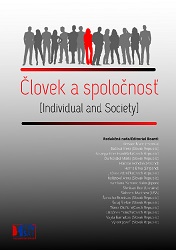Computer Literacy Improvement in a Health-Care Facility. The Case Study of Hospital Jihlava 2020 – 2021
Computer Literacy Improvement in a Health-Care Facility. The Case Study of Hospital Jihlava 2020 – 2021
Author(s): Jan Koumar, Jiří Schimmer, David ZažímalSubject(s): Education, Management and complex organizations, Health and medicine and law, Present Times (2010 - today), ICT Information and Communications Technologies
Published by: SAV - Slovenská akadémia vied - Spoločenskovedný ústav SAV
Keywords: Computer Literacy; ICT; Hospital Jihlava; Health-Care-Facility Improvement;
Summary/Abstract: This text addresses the process of improving computer literacy in Hospital Jihlava which is a non-profit organization situated in the middle of the Vysočina Region in the central Czech Republic serving 150,000 inhabitants and consisting of 18 medical departments. In 2020 there were over 1,500 employees, including around 200 doctors and 600 nurses. Every year on average number of 430,000 patients are treated there, with over 25,000 patients being hospitalized, and around 7,500 undergoing a surgery. The main aim of this text is to find out how the improvement in information technology skills can be dependent on the given training and the offered help with these basic skills. Since not all health-care professionals are capable of working with information technology, due to the fast development in the area, they must be continually educated in it, because the ability to work with the computers and software is far from being innate. In 2007, in connection with the growing need for a continual development in hospital employee’s IT skills and abilities in work with information technologies, a computer literacy survey was carried out. 652 respondents took part in it, out of who there were 555 women and 97 men. The highest level of computer knowledge amongst respondents was working with the Internet, while the lowest knowledge was found working with spreadsheets. Overall level of knowledge corresponded with the required skills of a given work position. The highest achieved level of formal education played a part, as did their age. This was why the position of ICT Lecturer was created in 2020 in order to improve the computer literacy of the staff. Computer literacy here is understood as a set of knowledge, skills and abilities that will enable individuals to use computer technology for their professional and personal life to the extent that they would not feel computer-handicapped or behind a "digital wall", while their personal and professional development with the help of computer would be voluntary. This step was preceded by a unification of the crumbled software environment, which caused a lot of compatibility issues. In 2018 it was unified; Microsoft Office 365 was chosen because it has only one version and there is no need for upgrades to newer ones. With Office 365 a lot of other applications came, all the hospital, employees can use any of them, each employee owns a version of Office 365. They can use it locally on any computer in Hospital Jihlava or at their mobile devices, they can work remotely. Then the training courses in Hospital Jihlava started. They were aimed at all employees of the facility, though mainly at those afraid of computers due to the lack of basic computer literacy. The training programs were offered between May 2020 and April 2021, though the participation was not obligatory, the number of trained people rose to 872. The training method was a monological lecture for the group of 1-12 people, combined with the practical demonstration of the program functions, which the participants were able to test with the help of the lecturer. The training topics were divided in two main categories: a - basic work with computer and the main rules of cyber security; and b - office and communication platforms and applications. Group a/ consisted of the trainings meant to cover the fears of work with the computer systems, its topics were: Work with PC, Computer for Beginners, and basic rules of cybersecurity. The b/ group expected to cover the basic office and communication platforms and applications, it consisted of these trainings: MS Word, MS Excel, MS PowerPoint, MS OneNote, MS Outlook and E-Mail Security, MS OneDrive, MS Teams, MS Forms, MS Stream. The training courses were supplemented by video courses aimed to help retain the gained skills which could be immediately applied at everyday work. The trainings turned out to be an immense investment into potential capacity of the employees, which in turn can be used to the overall organisation development. Its best visible result was in the readiness for the implementation of a new Hospital Information System in March 2021, but there was a measurable increase in the number of the active usage of the main trained applications. The limits of the conducted training process are addressed in the conclusion. At the first place, with motivation being the greatest issue. Although the IT training does not improve the primary qualification of the medical staff, the employees are eager to train their skills and learn to operate the apps to develop skills considered essential in current society. Yet, some of them are hindered from learning to work with information technologies through lacking confidence. Therefore, the necessity to motivate people to undergo training and develop their own knowledge and skills is a future challenge for the IT department of Hospital Jihlava.
Journal: Človek a spoločnosť
- Issue Year: 24/2021
- Issue No: 2
- Page Range: 1-18
- Page Count: 18
- Language: English

